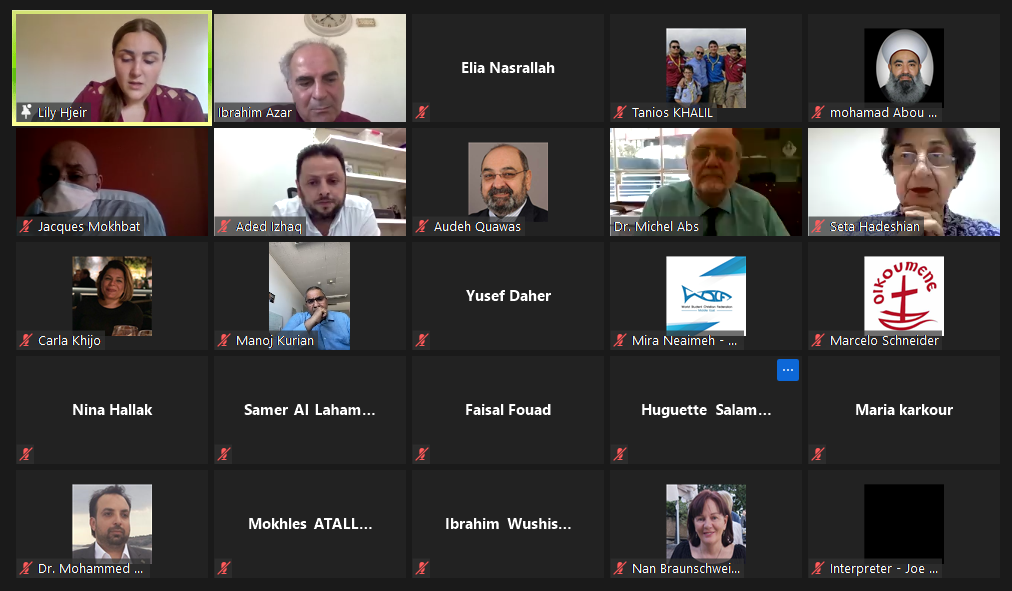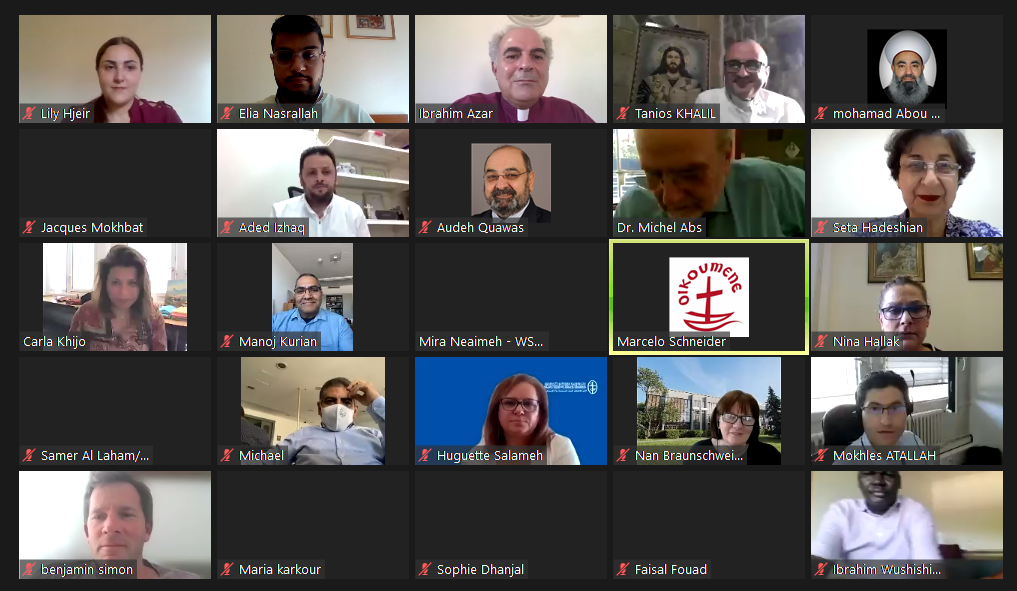The East and Covid-19, From Battle to Recovery
A Webinar Organized by WCC and MECC
Secretary General Dr. Michel Abs: “Covid-19 is not something inflicted by God on the human race; humans pushed their luck in making nature bear more than it can take”
An international webinar was organized by the World Council of Churches (WCC) in partnership with the Middle East Council of Churches (MECC) on June 14 as part of the ongoing series on the Pilgrimage of Justice and Peace. It was entitled “Covid-19 in Times of Unrest – economic crises and sociopolitical conflicts” facing the Middle East.
MECC Secretary General Dr. Michel Abs participated in the webinar along with many specialists and officials from different regional countries including Lebanon, Jordan, Iraq, and Palestine… Talks were focused on the economic and socio-political context, medical infrastructure, just access to testing and vaccines, refugees, youth, and the role of religious institutions in the battle against Covid-19.
Member of the Executive Committee of the Middle East Council of Churches Bishop Ibrahim Azar from the Evangelical Lutheran Church in Jordan and the Holy Land moderated the webinar, after opening with a prayer that our thoughts and actions may be rooted and grounded in God’s love for us. He then spoke about vaccination in Jordan saying: “Vaccination is also in our region now well-taken by the people but many of them have many questions about their fears, many still are worried about what will happen after five or seven years.”
WCC Deputy General Secretary Dr. Isabel Apawo Phiri stressed that in our common Pilgrimage of Justice and peace, we are part of one body in Christ. She said: “We are bound together as one humanity on our one planet. The suffering that each person feels in one region or one family affects us all. Let us build up our knowledge and wisdom with compassion and empathy as one body in Christ to overcome this crisis.”
MECC Secretary General Dr. Michel Abs reflected during the first discussion session on how people see the pandemic: “It is not something which is inflicted by God on the human race. They are doing things against the will of God, the teaching of the Gospel, and the teaching of human values. The human beings went too far and pushed the luck too much in making nature bear much more than it can take.” Dr. Abs gave a brief overview and analysis on the economic, social and political situation in the Middle East, presenting the catastrophic repercussions of Covid-19 at many levels in Lebanon and the region.
In the following session, infectiology specialist Dr. Jacques Moukhbat spoke about the Covid-19 reality, its development in Lebanon since the discovery of the first infection in February 2020, and the most prominent negative and positive stages that the country has experienced as a result of the outbreak, he mentioned vaccination campaigns and the work put in place to reach the stage of recovery.
Then, member of the Jordanian Senate and of the Executive Committee of the Middle East Council of Churches Dr. Odeh Kawas provided a brief report on the situation of the pandemic, access to vaccinations and vaccination plans in Jordan. Dr. Adel Ishaq from Iraq explained the repercussions of the virus on many levels in the country, as well as its spread in refugee camps, and steps to be taken to overcome the pandemic.
In the other sessions, Regional Secretary of the World Student Christian Federation in the Middle East Ms. Mira Nouaymeh spoke about the situation of young people in Lebanon and the in region regarding the outbreak of the Covid-19, and their fears and concerns about its spread and how to help them confront it. The judge in the Spiritual Court of Sidon, Lebanon, and university professor His Eminence Sheikh Muhammad Abu Zeid also addressed the work places of worship and Islamic institutions have put in place to adapt to the pandemic and stand by believers. President of ATIME of the Middle East Council of Churches Father Dr. Tanios Khalil, in turn, presented the role of churches in light of this health crisis and its transition to the digital world for believers to preserve their spiritual life.
During the meeting, speakers presented statistics about coronavirus infections, deaths and recovery cases in the Middle East, and attendees were able to ask their questions to the speakers. The webinar ended with a summary of the most important topics discussed during the sessions.


